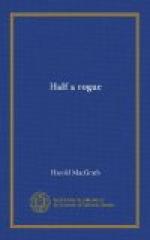“Fine! Can you spare me another piece?”
“I’m glad you’ll never be too proud to eat pie,” she returned.
“Not even when it’s humble,” laughed Warrington.
“There are some folks roundabout who do not think pie is proper,” seriously.
“Not proper? Tommyrot! Pie is an institution; it is as unassailable as the Constitution of the country. I do not speak of the human constitution. There are some folks so purse-proud that they call pies tarts.”
She looked askance at him. There were times when she wasn’t quite sure of this boy of hers. He might be serious, and then again he might be quietly laughing. But she saw with satisfaction that the pie disappeared.
“The world, Richard, isn’t what it was in my time.”
“I dare say it isn’t, Aunty; yet cherries are just as good as ever and June as beautiful. It isn’t the world, Aunt o’ mine; it’s the plaguy people. Those who stay away from church ought to go, and those who go ought to stay away. I’m going down to the club this afternoon. I shall dine there, and later look up the Benningtons. So don’t keep dinner waiting for me.”
“Cheer her up, Richard; she needs cheering. It’s been a blow to her to lose her boy. If you’d only get married, too, Richard, I could die content. What in the world shall you do when I am gone?”
“Heaven knows!” The thought of losing this dear old soul gave a serious tone to his voice. He kissed her on the cheek and went out into the hall. Jove came waltzing after him. “Humph! What do you want, sir? Want to go out with me, eh? Very well; but you must promise to behave yourself. I’ll have you talking to no poor-dog trash, mind.” Jove promised unutterable things. “Come on, then.”
He walked slowly down town, his cane behind his back, his chin in his collar, deep in meditation. He knew instinctively that Mrs. Bennington wanted to talk to him about the coming marriage. He determined to tell her the truth, truth that would set her mother’s heart at peace.
Jove ran hither and thither importantly. It was good to be out with the master. He ran into this yard and that, scared a cat up a tree, chased the sparrows, and grumbled at the other dogs he saw. All at once he paused, stiffened, each muscle tense. Warrington, catching the pose, looked up. A handsome trotter was coming along at a walk. In the light road-wagon sat a man and a white bulldog. It was easy for Warrington to recognize McQuade, who in turn knew that this good-looking young man must be the dramatist. The two glanced at each other casually. They were unacquainted. Not so the dogs. They had met. The white bull teetered on the seat. Jove bared his strong teeth. How he hated that sleek white brute up there! He would have given his life for one good hold on that broad throat. The white dog was thinking, too. Some day, when the time came, he would clean the slate. Once he had almost had the tan for his own. And he hated the girl who had beaten him off with her heavy riding-crop.




